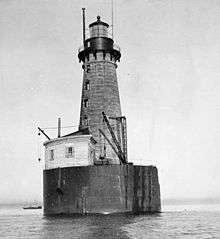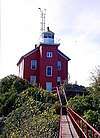Stannard Rock Light
The Stannard Rock Light, completed in 1883, is a lighthouse located on a reef that was the most serious hazard to navigation on Lake Superior. The exposed crib of the Stannard Rock Light is rated as one of the top ten engineering feats in the United States.[9] It is 24 miles (39 km) from the nearest land, making it the most distant (from shore) lighthouse in the United States. It was one of the "stag stations", manned only by men, and had the nickname "The Loneliest Place in the World".
 Stannard Rock Light | |
 | |

| |
| Location | Off Keweenaw Peninsula in Lake Superior |
|---|---|
| Coordinates | 47°11′0.62″N 87°13′30.42″W |
| Year first constructed | 1883 |
| Year first lit | 1883[1] |
| Automated | 1962[1] |
| Foundation | Crib[1] |
| Construction | Dressed stone,[1] Monolithic limestone/iron bolts. |
| Tower shape | Frustum of a cone tower on cylindrical crib[1] |
| Markings / pattern | Natural with black lantern[2] |
| Tower height | 100 feet (30 m)[2] |
| Focal height | 102 feet (31 m)[2] |
| Original lens | - 3rd order Fresnel Lens |
| Current lens | Solar powered 12-inch (300 mm) Tideland Signal ML-300 acrylic lens[2] |
| Intensity | 3,000 candlepower[3] |
| Range | 18 nautical miles (33 km; 21 mi) |
| Characteristic | Flashing, white, 6 sec[4] |
| Fog signal | Air diaphone (originally steam whistle)[1] |
| ARLHS number | 808 [5][6][7] |
| USCG number | 7-14725[4] |
| Heritage | place listed on the National Register of Historic Places |
Stannard Rock Lighthouse | |
| Area | less than one acre |
| Architect | US Lighthouse Board: Major Godfrey Weitzel |
| Architectural style | limestone monolith |
| NRHP reference No. | 73000953[8] |
| Added to NRHP | March 30, 1973 |
The lighthouse was automated in 1962 and the United States Coast Guard still maintains it as an active aid to navigation. It is closed to the public and can only be viewed by boat or airplane. It was listed on the National Register of Historic Places in 1971.
Stannard Rock Reef
The Stannard Rock Reef is located off Keweenaw Peninsula about 24 miles (39 km) south of Manitou Island and 44 miles (71 km) north of Marquette, Michigan.[1][10] In 1835, Captain Charles C. Stannard of the vessel John Jacob Astor first discovered this underwater mountain that extends for 0.25 miles (0.40 km) with depths as shallow as 4 feet (1.2 m) and averaging 16 feet (4.9 m).[10][11] This reef was the most serious danger to navigation on Lake Superior and it was first marked by a day beacon in 1868, at which time tests were undertaken to determine if a light could survive in this harsh location, "atop a mile long reef" more than 50 miles northwest of Marquette. A temporary marker was placed at the location in 1866.[12] The opening of the Soo Locks and the rapid increase in commerce between Duluth, Minnesota, and the lower Great Lakes demanded construction of a lighthouse.[1][10] The lighthouse was named for Captain Stannard.[11] The Stannard Rock Light is 24 miles (39 km) from the nearest land making it the most distant from shore of any lighthouse in the United States.[13] Stannard Rock Reef provides a year-round structure for a superior lake trout fishery. Michigan's state record for lake trout, a 61-pound-8-ounce (27.9 kg) specimen, was caught on 12-pound (5.4 kg) line at Stannard Rock Reef by 16-year-old Lucas Lanczy on August 17, 1997.[14][15]
Construction
Orlando Metcalfe Poe of the Lighthouse Board solved the logistics problem of constructing a lighthouse on the remote Stannard Rock Light by using the same process and all the apparatus and machinery used to build the tower and permanent protective crib of the Spectacle Reef Light on Lake Huron. The machinery included a steam and pulley operated cement mixer and a steam powered planing machine used to shape timbers.[16]
The brief season for work on the remote reef in Lake Superior lasted from May to October with many days lost to inclement weather.[16] All of the machinery used to construct the Spectacle Reef Light was moved to the depot at Huron Bay on Lake Superior for construction of the crib for the Stannard Rock Light, which began in July 1877. Blocks of stone were cut at Marblehead, Ohio and shipped to the site for construction of the tower.[16] The crib was taken out to Stannard Rock in August 1877, and soundings were made for fitting the crib to the reef. The crib was then returned to Huron Bay and built up to 14 courses; it was returned to Stannard Rock in August 1878 and placed in position on the reef. By October 1878 the crib was filled with concrete and stone from a quarry opened on Huron Island. By June 1879 an iron pier had been built up to the surface of the water. By mid-1880 the structure was 14 feet (4.3 m) above the water. The tower was completed and the first light was exhibited on July 4, 1882. Work on the tower continued until 1883. It took five years to complete the construction of the Stannard Rock Light at the cost of $305,000,[1] (just $5,000 more than the original estimate)[17] 126 tons of iron, 76 tons of brick, 1,270 tons of tower stone, and 7,276 tons of concrete were used in the lighthouse's construction.[16] The exposed crib of the Stannard Rock Light is rated by the National Park Service as one of top ten engineering feats in the United States.[2]
It is said to be the farthest offshore of any lighthouse in the United States.[18][19] "This is probably the most exposed of all Great Lakes lighthouses."[7]
The light output varied from 156,000 to 248,000 candlepower over many years.[19]
Lighthouse service
In early winter Lake Superior's waves splashing against the stone tower of the Stannard Rock Light built a layer of ice that forced maintenance crews to hack away the ice around the door to reach the men. If an illness, accident, or fire occurred at the Stannard Rock Light it could be days or even weeks before the keepers got assistance. As one of the rock lighthouses, it was designated as a "stag station" where only men could serve without their families.[20] The keepers called the Stannard Rock Light the "Loneliest Place in the World"[16][20] and it has always carried the distinction of being the "loneliest place" in the continental United States.[16] Maritime historian Wes Oleszwski reported that duty at the Stannard Rock Light was so rough that of the keepers and assistant keepers, there were four resignations and three transfers in the first three seasons of the station's operation.[16]
The lighthouse keepers were taken off the Stannard Rock at the close of shipping season in early December. The towers were locked until the keepers returned in March for the start of the shipping season. Landing at the Stannard Rock Light was difficult, but often the more serious problem at the start of the season was the need to take sledgehammers and pickaxes to clear away layers of thick ice (1 to 2 feet (0.30 to 0.61 m) deep) on the entry door, lantern, and foghorns.[20]
The Stannard Rock Light keepers operated the lantern and the living quarters with flammable illuminants for 60 years; the lighthouse was not electrified until after World War II. It was just a few years after this that an explosion of gasoline and propane tanks used to fuel the station plant destroyed the buildings on the pier and severely damaged the interior of the tower. The explosion killed one keeper and left three others stranded on the concrete pier at the base of the tower for three days before a passing ship discovered them and notified the Coast Guard. The men were rescued by the tender Woodrush.[20]
After the accident, the Coast Guard repaired the fire damage, decided that the place was too remote and dangerous, and automated the station in 1962.[20] The 1,400,000 candlepower light was replaced with a 3,000 candlepower light.[3] The Coast Guard carefully disassembled the 2nd order, 12 bulls-eyed Fresnel lens, hauled it down 141 tower stairs, packed it in six wooden crates, and then lowered the crates by block and tackle 80 feet (24 m) down to the crib for shipment. After a protracted search, the Fresnel lens was found 37 years later at the Coast Guard Academy's storage warehouse in New London, Connecticut. The base unit for the lens was relocated from the tower to the museum in 2000.[7] The lens is now on display at the Marquette Maritime Museum. See, Marquette Harbor Light.[19]
Double mission and current status
The Stannard Rock Light remains the property of the Coast Guard as an active aid to navigation. The lighthouse can only be viewed by airplane or boat and it is closed to the public.[1][10] After more than a century of warning mariners away from the treacherous reef, the lighthouse was given a new mission in 2008 when scientists placed equipment atop the tower to measure whether increased evaporation was the cause of receding Great Lakes water levels.[21]
Boat trips out to the lighthouse are available, although visitors are not allowed to enter it.[22]
References
- "Historic Light Station Information and Photography: Michigan". United States Coast Guard Historian's Office. Archived from the original on 2017-05-01. Retrieved June 9, 2009.
- "Stannard Rock Light". Inventory of Historic Light Stations, Michigan Lighthouses. National Park Service Maritime Heritage Project. Retrieved June 9, 2009.
- Holland, Jr., Francis Ross (1988). America's Lighthouses: An Illustrated History. New York: Courier Dover Publications. p. 187. ISBN 978-0-486-25576-7. Retrieved June 8, 2009.
- Light List, Volume VII, Great Lakes (PDF). Light List. United States Coast Guard.
- "Stannard Rock (Lake Superior) Light ARLHS USA-808". Amateur Radio Lighthouse Society. May 12, 2008. Retrieved August 26, 2012.
- "Lighthouse 'U' List". Amateur Radio Lighthouse Society. Archived from the original on April 21, 2009.
- Rowlett, Russ. "Lighthouses of the United States: Michigan's Eastern Upper Peninsula". The Lighthouse Directory. University of North Carolina at Chapel Hill.
- "National Register Information System". National Register of Historic Places. National Park Service. March 13, 2009.
- "Stannard Rock Lighthouse, Marquette, MI, Lake Superior". Michigan Lighthouse Conservancy. August 24, 2003. Retrieved August 26, 2012.
- Wobser, Dave. "Stannard Rock Light". Lighthouses of the Great Lakes. Boat Nerd. Retrieved June 9, 2009.
- "Stannard Rock Light". Midwest Connection. Retrieved June 9, 2009.
- Roach, Jerry; Roach, Barb (2007). The Ultimate Guide to Upper Michigan Lighthouses. Bugs Publishing. ISBN 978-0-9747977-2-4.
- Putnam, George R. (January 1913). "Beacons of the Seas: Lighting the Coasts of the United States". National Geographic Magazine. XXIV (1): 19. Retrieved June 8, 2009.
- Hirt, Jack (July 2009). "Reefing Gitchigumee's Greatest Lakers: Lake trout are superior at Stannard Rock". Great Lakes Anglers: 20–21.
- "51 Year Record Broken: Possible World Record on 12 lb. Line". Weekly News. Great Lakes Sports Fishing Council. August 18, 1997. Retrieved May 17, 2011.
- Oleszewski, Wes (1999). Lighthouse Adventures: Heroes, Haunts, & Havoc on the Great Lakes. Gwinn, MI: Avery Color Studios. pp. 21–37. ISBN 9781892384010.
- "Stannard Rock Light, MI". Lighthouse Friends. Retrieved August 26, 2012.
- "Stannard Rock Lighthouse". The Lighthouse People. Retrieved August 26, 2012.
- Nelson, Donald (February 2000). "Long Lost Light". Lighthouse Digest. Retrieved June 9, 2009.
- De Wire, Elinor (1995). Guardians of the Lights: Stories of U.S. Lighthouse Keepers. Sarasota, FL: Pineapple Press. pp. 10, 39, 100, 141, 316. ISBN 978-1-56164-077-5. Retrieved June 8, 2009.
- "Lake Watch: Monitoring set up at Stannard Rock". The Mining Journal. Marquette, MI. June 8, 2008. ISSN 0898-4964. Retrieved June 9, 2009.
- Pepper, Terry (November 6, 2005). "Stannard Rock Light". Seeing the Light. Retrieved August 26, 2012.
Further reading
- Weitzel, Godfrey (1882). Report Upon the Construction of Stannard's Rock Light Station, Lake Superior, Michigan, Appendix to the 1882 Annual Report of the Lighthouse Board (Report). Washington, DC: Government Printing Office. pp. 85–102.
External links
| Wikimedia Commons has media related to Stannard Rock Light. |


